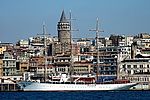Language:
Professionals:
Office Locations:
News & Service:
Culture and Religion
The urban landscape of Istanbul is shaped by Christian and Islamic ecclesiastical buildings. In some districts, such as Kuzguncuk, the buildings of different religions are very close to each other. The majority of the population are Muslims. Greek Orthodox Christians, Armenian Christians and Sephardic Jews are important religious minorities.
The city is the seat of the Ecumenical Patriarch of Constantinople, under whose authority are some of Orthodox churches in today's Turkey, and who has the honorary status of priority among all Orthodox churches. An Armenian Archbishop and the Turkish Chief Rabbi also reside in the city.
German Chamber of Foreign Trade (AHK)
 Internet presence of the German-Turkish Chamber of Industry and Commerce
Internet presence of the German-Turkish Chamber of Industry and Commerce
Booming economy
Today, Istanbul is the dominant Turkish market and hub. The Istanbul economy has been experiencing a strong upward trend since the 1980s. The gross domestic product (GDP) has grown by an average of five per cent per year since 1980. Economic life, focused on the service sector, is dominated by the stock exchange, wholesalers, and the traffic, bank, press and publishing industries.
The city has several Bazaars as well as modern, Western-style shopping centres.
Craft enterprises and industrial businesses mainly produce textiles and foodstuffs.
Other significant products are leather and synthetic leather articles as well as ceramic goods. The manufacture of buses, tractors and diesel engines is another important economic sector. On the shores of the Bosphorus and of the Maramara Sea, new industrial facilities have been built. Turkish investors and investors from all over the world have turned Istanbul into an important commercial metropolis.
Tourism
One of the most important economic sectors is tourism: A large variety of hotels is on offer - you will find everything, from stylish luxury hotels to inexpensive guesthouses. Istanbul's historic buildings, its cosmopolitan charm, its budding internationalism and rich cultural life attract many foreign and domestic tourists, making Istanbul a melting pot of the cultures between the Orient and the Occident.






